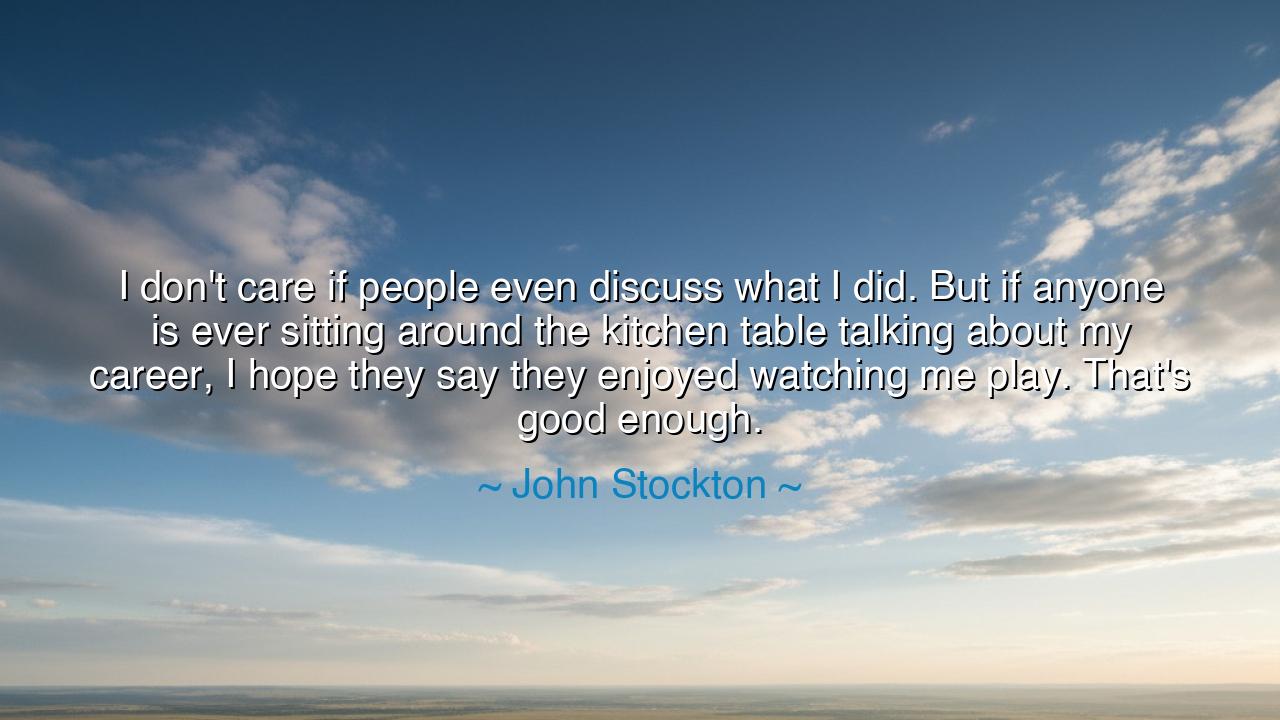
I don't care if people even discuss what I did. But if anyone is
I don't care if people even discuss what I did. But if anyone is ever sitting around the kitchen table talking about my career, I hope they say they enjoyed watching me play. That's good enough.






The words of John Stockton — “I don’t care if people even discuss what I did. But if anyone is ever sitting around the kitchen table talking about my career, I hope they say they enjoyed watching me play. That’s good enough.” — shine with a humble brilliance that few in the modern age of fame can truly understand. In them, the great point guard of the Utah Jazz reveals the heart of a true craftsman, one who finds meaning not in glory or legacy, but in the simple joy of giving his best. It is a philosophy as old as the Stoics and as timeless as the games played since men first gathered to test their strength, skill, and spirit. Stockton’s words remind us that the highest form of greatness is humility, and that the noblest legacy is not written in record books, but in the quiet admiration of those who watched and felt inspired.
In the ancient world, such humility was the mark of wisdom. The philosopher Epictetus taught that the only thing a man truly controls is his effort, not the opinion of others. Stockton’s words echo that same truth — that fame, praise, and remembrance are fleeting illusions, beyond one’s command. What endures is the integrity of one’s labor, the purity of one’s intent. The athlete, like the artist, must perform not for the approval of the crowd but for the perfection of his craft. To be content that others “enjoyed watching” — that they found joy, awe, or inspiration in one’s effort — is to live and work in harmony with virtue itself.
John Stockton was known not for spectacle, but for precision. He was a master of simplicity, a silent architect of victory, the passer who made others great. He set the all-time records for assists and steals, yet carried himself without vanity, often deflecting attention to his teammates. His greatness was quiet — a greatness of discipline and constancy, of showing up every day and doing the right thing well. In this quote, we hear the voice of a man who understands that the measure of a life’s work lies not in applause, but in the quiet satisfaction of having brought joy and meaning to others.
History has seen many who shared this spirit. Consider the painter Johannes Vermeer, who lived and died in obscurity, his art forgotten for centuries. He never knew fame, yet his paintings — quiet scenes of light and stillness — now move millions. He worked not for renown, but for beauty’s sake. Or think of Mother Teresa, who cared not for recognition but only for the suffering before her. In every age, the truly good laborer seeks no monument for himself, but leaves one in the hearts of those he has touched. Stockton’s wish — that people might simply say, “We enjoyed watching him play” — is of this same sacred kind. It is the legacy of those who serve with purity of purpose.
There is a deeper wisdom in his words, too — that joy shared is the truest victory. In a world that measures success by fame, wealth, and dominance, Stockton’s humility cuts like a clear wind. He reminds us that meaning does not lie in being remembered, but in how we live while we are here. The true player, the true artist, the true human being — these care not for statues or stories, but for the living connection between themselves and others. What is glory, after all, but a shadow of the real light, which is the moment of shared joy between performer and witness, giver and receiver?
When the ancient heroes were celebrated in song, the wise among them knew that fame was but an echo. Achilles himself, when he met Odysseus in the underworld, confessed that he would rather be a living servant than a dead legend. So too, Stockton’s wish is not to be enshrined in endless talk or records, but to have lived in a way that brought delight to others. For to bring joy to others through one’s gifts — that is the true immortality of the soul. It is the kind of legacy that lives not in marble or memory, but in the warm light of a thousand kitchen tables where people smile and say, “We loved watching him play.”
Let this be the lesson: do your work with love, and let go of the rest. Pour your heart into what you do, but do not chase the echo of applause. Ask not to be remembered, but to have given something beautiful to the world while you could. Whether you are a craftsman, a teacher, an artist, or a friend, let your measure be this — that others were uplifted by your presence, even if they forget your name.
So live as John Stockton played — with quiet excellence, steadfast purpose, and humility of heart. Seek not the crowns of men, but the satisfaction of knowing you gave your best, honestly and fully. And if, years from now, people sit together and remember you with warmth — not as a legend, but as someone who brought them joy — then, as Stockton said, that is good enough.






AAdministratorAdministrator
Welcome, honored guests. Please leave a comment, we will respond soon